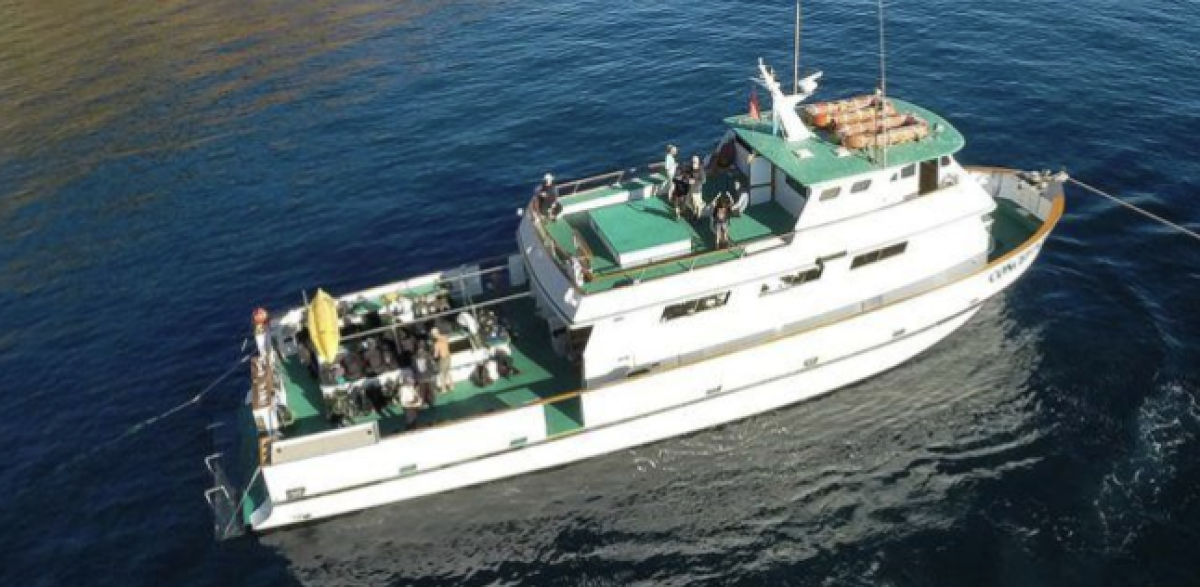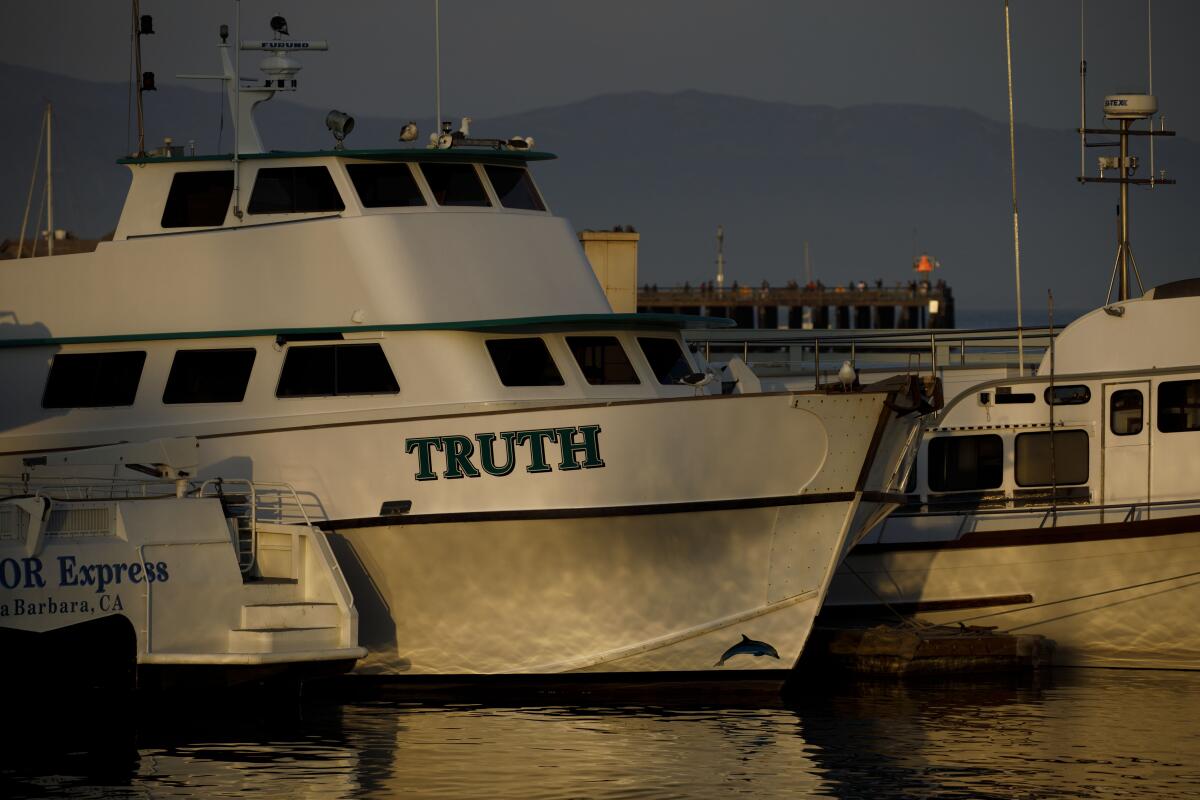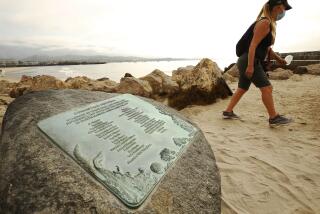Before Conception boat fire, some captains say Coast Guard safety rule was ignored
SANTA BARBARA — U.S. Coast Guard safety rules for small boats are clear and unambiguous: Operators must have at least one crew member roving the vessel whenever passengers are in the bunk area, regardless of whether the vessel is docked or at sea.
When 34 people were killed in a fire early Labor Day morning aboard the diving boat Conception, investigators quickly concluded that all six crew members were asleep and that there was no roving watch during those critical hours when passengers were asleep below deck.
But now, there are growing questions about whether the operator of the Conception regularly had roving watches on its boats.
In interviews with The Times, two former captains for Truth Aquatics — which owns both the Conception and its sister boats, the Vision and Truth — said that when they operated the company’s boats they didn’t have formal roving watch schedules even though they were required by Coast Guard regulations. The Coast Guard required the watches as part of its inspection certification.
Don Rowell, a Truth captain from 2001 to 2008, said he would stay up all night during bad weather but didn’t designate someone as the roving watch.
“It’s a regulation, but it wasn’t really followed,” Rowell said. “I don’t know if you’d call it a problem or not; it’s something that everyone should have and will have from now on out.”
James Hrabak, a Vision captain from 2001 to 2003 and now a relief captain, said his crew regularly checked the boat at night but did not have a formal night watch.
“I did not say, ‘Richard, you are going to take watch for four hours,’” he said.
Truth Aquatics owner Glen Fritzler gave captains “the power” and “full autonomy to run the boats as they want,” he added.
“He allows captains to do as they will,” said Hrabak, currently a senior patrol officer with the Channel Islands Harbor. “It was almost like they leased the boats instead of running the boat for Truth Aquatics.”
Fritzler, through his attorney, declined to comment. In the days after the fire, a statement from an attorney representing Truth Aquatics said a crew member had checked the area where the fire broke out about a half-hour earlier and found nothing unusual.
The fire is now the subject of a criminal investigation by the Coast Guard and FBI that’s overseen by the U.S. Attorney’s office, in addition to probes by the National Transportation Safety Board and the Coast Guard Marine Board of Investigation. A preliminary investigation by the NTSB found that five crew members were sleeping in berths behind the wheelhouse when the fire broke out.
By the time crew members woke and jumped down to the main deck, they found the galley and salon engulfed in flames. The main bunk room where their 33 customers and a fellow crew member dozed lay directly below, in the belly of the boat. The only way out was through the inferno. No one made that escape.
Officials have said the purpose of having a night watch is to detect dangers such as fires early. With so many people tightly packed in a wooden and fiberglass vessel, at the whims of the ocean and wind, situations can turn dire in an instant.
In recent weeks, The Times interviewed Truth Aquatics crew members and associates who took numerous trips on the company’s boats going back years.
Most defended the company’s safety record and said they believe crew members worked tirelessly to keep passengers safe. But several said they knew of no formal roving watch or that they could not recall it being a part of boat operations. One said they believe there was a roving watch on the Truth Aquatics vessel they worked on.
Hrabak last captained the Vision in November 2018. Federal investigators, he said, recently asked how the vessels and company operated. Hrabak said he told investigators he knew Jerry Boylan, the Conception captain, for “a long, long time” and considered him “as fine a skipper of a boat in the industry.”
He recalled an agent’s reply: “Then why didn’t he run a roving watch?”
Boylan could not be reached for comment.

When Hrabak operated the Vision, the crew would be up at all hours and “would walk all the decks when they got up to go to the bathroom,” and passengers would do the same, he said. Still, the regulations for a roving watch are clear and “not a captain’s discretion,” he said.
He believes the lack of a roving watch is a “widespread” problem in the boating industry because few incidents occur when boats are anchored at night.
“How did we get so far away from that?” Hrabak said. “We have fallen into complacency. We are not invincible. We never thought this could happen, and then this happened.”
Hrabak called Truth Aquatics a “great company” and said Fritzler “took care of his crew” and spared no expense on the boats, taking thousands of divers on trips.
But he said he will operate differently once he’s back at the helm. Hrabak is scheduled to captain a dive trip in March with Truth Aquatics and said he would designate a roving watch, even if it requires additional crew members.
“Lots of things are going to be different,” he said.
Chris Connolly worked as a crew member and captain of the Vision in the 1990s and said he did not remember whether someone was designated as a roving watch. The boats are small enough so that crew members could monitor them without moving around and waking passengers, he said.
“Somebody every couple of minutes is getting up to go to the bathroom and the same thing with the crew upstairs in the wheelhouse,” he said. “I just know it seems there was always somebody awake on the boat.”
He added: “There’s a fine line between roving around and making noise and monitoring.”
Ralph Clevenger, who ran an underwater photography class on Truth Aquatics’ boats for more than a decade, said he had never heard crews or passengers mention roving watches during any excursion.
“I know about roving night watchman because I’ve been on much bigger ships,” he said. “I had never heard about it relative to dive boats.”
Don Barthelmess, who taught diving at Santa Barbara City College for decades and is friends with Fritzler, recalled crew members “up moving around the deck” and “checking on things.” Speaking generally about dive boat operations, he said it’s typical for a crew member to take a break from roving a ship on overnight dive trips.
“There’s people staying up late at night, checking on anchors, checking things, but if someone lays down in their bunk, there’s nobody to police that,” he said. “It’s never been an issue — everybody does it.”
In the weeks after the deadly Conception fire, Coast Guard inspectors across the country scurried to inspect small vessels that accommodate overnight passengers. Captains told The Times that inspectors asked them to make voluntary safety improvements for fire protection, escape hatches, emergency signs and updating policies for a roving watch.
Carl Mayhugh, captain and owner of the 65-foot Magician dive boat in Ventura County, said he installed an electronic device in the galley that a crew member on roving watch must punch every 15 minutes or an alarm will go off. Mayhugh said he has the only key to turn it off. Those types of systems, he said, have always been standard on larger vessels to ensure the crew meets requirements.

“It is a horrific-sounding alarm,” Mayhugh said. “It was $140 for peace of mind.”
Jason Barrow, owner and captain of the 68-foot Island Diver in Panama City, Fla., said it’s common knowledge among the crew what is expected of the roving watch. Still, Coast Guard inspectors reviewed his book of procedures and asked him to write a detailed policy to explain the duties of a roving watch, Barrow said.
“It was just general knowledge for us that it was a standard operating procedure,” he said. “One person absolutely has to be up and roving.”
Capt. Joe Chait, who owns the 65-foot fishing charter Pegasus in San Diego, said the Conception disaster should be a wakeup call for the boat industry about the importance of night watches.
“There is a reason why that is listed in federal regulations,” Chait told The Times. “It’s listed in the certificate of inspection. It’s required. It boils down to nobody was awake. The industry was devastated.”
More to Read
Sign up for Essential California
The most important California stories and recommendations in your inbox every morning.
You may occasionally receive promotional content from the Los Angeles Times.













